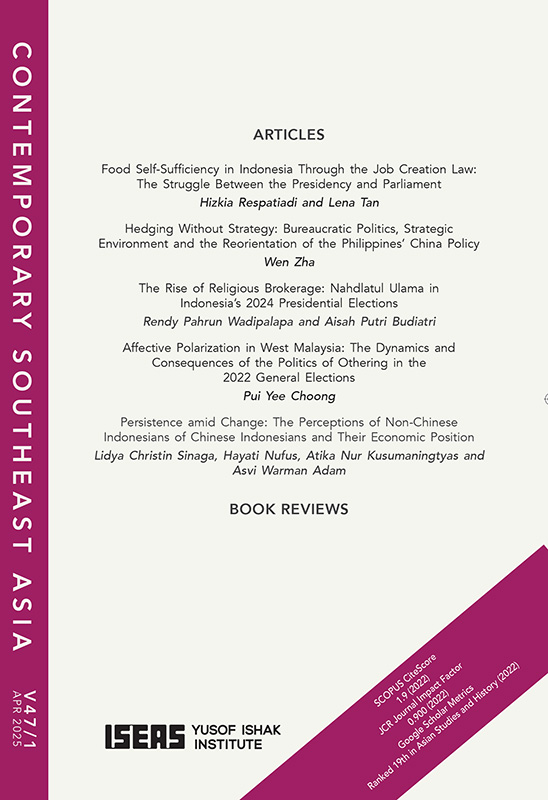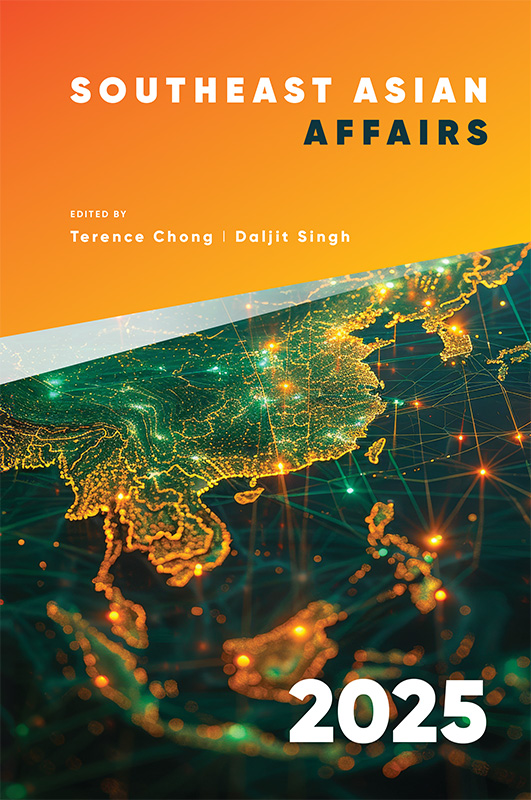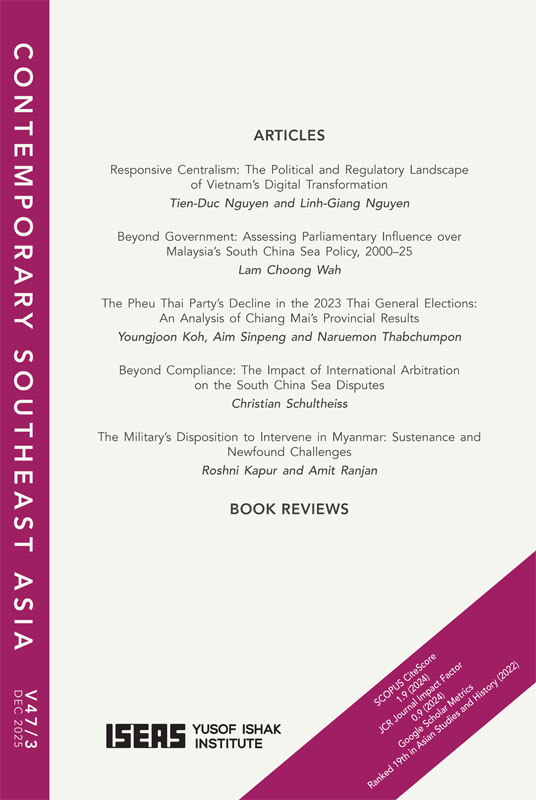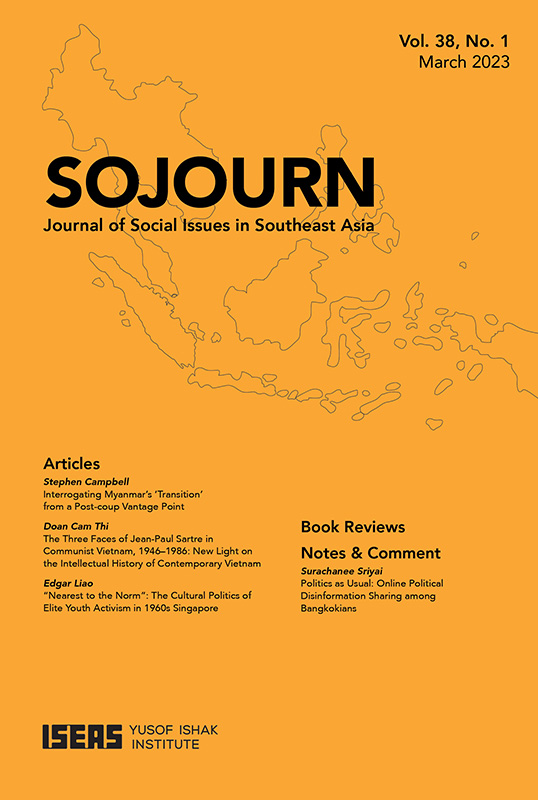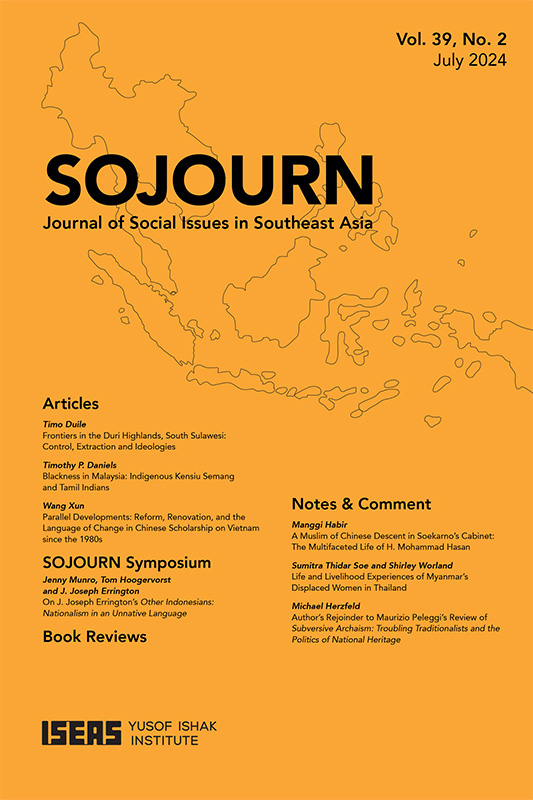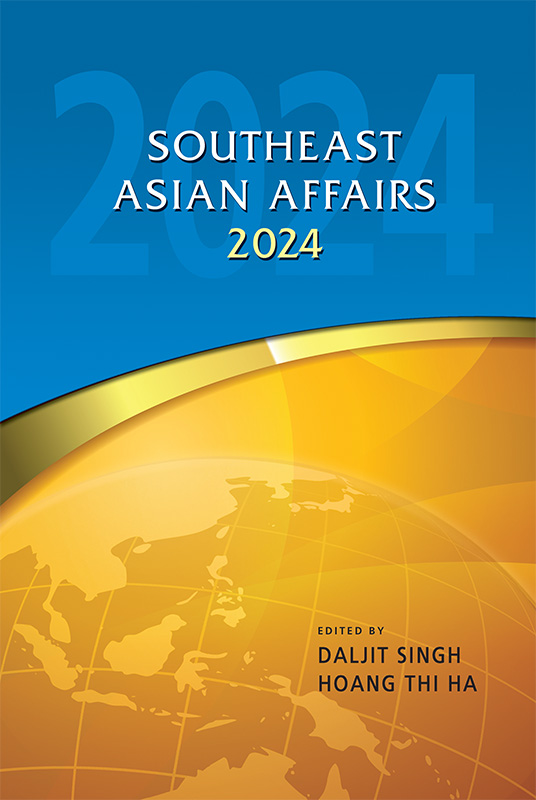Contemporary Southeast Asia Vol. 46/2 (August 2024)
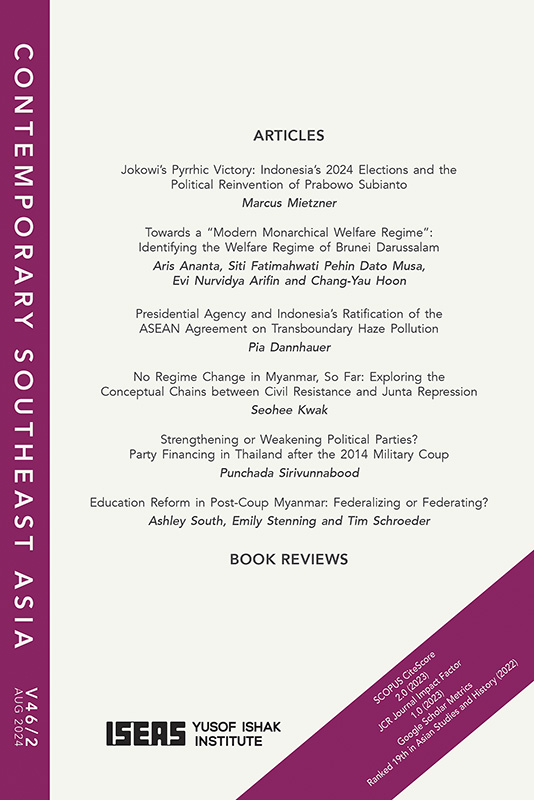
Date of publication:
August 2024
Publisher:
ISEAS – Yusof Ishak Institute
Number of pages:
170
Code:
CS46/2
Soft Cover
ISSN: 0129797X
Contents
-
Contemporary Southeast Asia Vol. 46/2 (August 2024)
[Whole Publication, ISSN: 1793284X] -
Preliminary pages
- ARTICLES
-
1. Jokowi’s Pyrrhic Victory: Indonesia’s 2024 Elections and the Political Reinvention of Prabowo Subianto, by Marcus Mietzner, author see abstractPrabowo Subianto’s victory in Indonesia’s 2024 presidential elections was decisive, and it is widely accepted that incumbent President Joko Widodo’s de facto endorsement of him played a significant role in this outcome. But the motivations of Widodo (commonly known as “Jokowi”) for picking his former adversary as his heir, and the reasons for his determination to get Prabowo elected in a landslide, remain poorly understood. This article demonstrates that Jokowi selected Prabowo after other options had fallen through, and that he made his choice with full awareness of the risks and uncertainties involved. By implication, he also tolerated the danger a Prabowo presidency could pose to Indonesian democracy. Tempted by Prabowo’s offer to make Jokowi’s son, Gibran Rakabuming Raka, his vice-presidential candidate, Jokowi went all-in and mobilized state resources to secure their triumph. Based on interviews with key actors, this article delivers a detailed picture of the factors that made Prabowo president—and that gave Jokowi few guarantees of continued influence.
-
2. Towards a “Modern Monarchical Welfare Regime”: Identifying the Welfare Regime of Brunei Darussalam, by Aris Ananta, Siti Fatimahwati Pehin Dato Musa, Evi Nurvidya Arifin, Chang-Yau Hoon, authors see abstractWhat sort of welfare regime does Brunei have? How does it compare to other countries’ welfare schemes? How will it change as Brunei seeks to diversify away from its dependency on hydrocarbon resources? Using the “welfare diamond” framework, this article argues that Brunei currently operates a “protective welfare regime”. However, if it succeeds in reducing its reliance on hydrocarbon resources, that system will transition towards a modern monarchical welfare-regime model wherein self-reliant individuals and resilient communities will play an increasingly significant role while the role of the state will diminish.
-
3. Presidential Agency and Indonesia’s Ratification of the ASEAN Agreement on Transboundary Haze Pollution, by Pia Dannhauer, author see abstractIndonesia, the leading source of haze in Southeast Asia, signed the ASEAN Agreement on Transboundary Haze Pollution (AATHP) in 2002 to demonstrate its commitment to regional cooperation. However, it took another 12 years for the country to ratify the accord, hindering effective collaboration. This delay is puzzling, especially since Indonesia faced pressure from its ASEAN neighbours to take action. At the same time, President Susilo Bambang Yudhoyono (2004–14), as the key decision-maker in Indonesia’s foreign policy, wanted his country to play a leadership role within the bloc. While ASEAN’s norms of noninterference and consensus may explain why the regional bloc struggled to pressure Jakarta to ratify the agreement, they do not fully explain why it took Indonesia 12 years to do so. Domestic resistance and institutional obstacles are alternative explanations, but they overlook the agency of the Indonesian president in pushing for ratification. Instead, this article uses role theory to argue that domestic contestation prevented President Yudhoyono from mobilizing his power for regional leadership and that he only asserted his institutional authority and resources to support the AATHP once he no longer depended on domestic political support. Thus, this article offers new empirical insights into the role of the Indonesian president in shaping foreign policy and ASEAN decision-making, as well as new theoretical insights on how leaders influence their country’s international roles.
-
4. No Regime Change in Myanmar, So Far: Exploring the Conceptual Chains between Civil Resistance and Junta Repression, by Seohee Kwak, author see abstractThe 2021 military coup in Myanmar incited widespread civil resistance, including mass street protests, a civil disobedience movement, labour strikes and armed rebellions. Despite more than three years of conflict, the junta maintains power in certain areas of the country. This article employs an outcome-explaining, process-tracing approach to elucidate the junta’s persistence. The analysis reveals that civil resistance activities are highly fragmented, with minimal convergence in their operations or long-term visions. This fragmentation stems from divergent views within the movement regarding non-violent versus armed resistance and the varied objectives of different armed ethnic organizations opposing the military. Concurrently, the junta has bolstered its repressive capabilities by developing institutionalized methods for countering adversarial forces. These methods are deeply intertwined with Myanmar’s ethnicpolitical history and the military’s entrenched dominance over political institutions. Consequently, this article contends that the evolution of both resistance efforts and the junta’s repressive strategies has been markedly asymmetrical.
-
5. Strengthening or Weakening Political Parties? Party Financing in Thailand after the 2014 Military Coup, by Punchada Sirivunnabood, author see abstractThailand’s Political Party Development Fund (PPDF) was created in 1998 to provide state subsidies to political parties. Primarily designed to reduce the influence of business conglomerates over parties by providing subvention from the state and to support their development by requiring them to establish local branches and recruit members, unintentionally it has also encouraged small and new parties to maximize their funding by creating inactive branches and registering fake members. In the wake of the 2014 military coup, the junta-appointed drafters of a new Constitution (promulgated in 2017) attempted to solve those problems through new regulations that allowed the state to control and limit parties’ freedom over financial management. This article examines these new laws. It finds that they have failed to curb corrupt practices among small parties while creating new obstacles for parties when trying to abide by the onerous reporting and compliance requirements. Thus, the new regulations have not promoted party development and are counterproductive for established parties.
-
6. Education Reform in Post-Coup Myanmar: Federalizing or Federating?, by Ashley South, Emily Stenning, Tim Schroeder, authors see abstractSince Myanmar transitioned from direct military rule in 2011, successive governments have attempted to decentralize the primary and higher education systems through top-down “federalizing” initiatives. However, these efforts have largely failed. However, following the February 2021 military coup, the absence of a credible central education authority has led ethnic armed organizations (EAOs) and non-state actors, including local communities, to provide education to up to one million of the most vulnerable and conflict-affected children. This represents a new “federating” moment for education in Myanmar, where capacity and alliances are built from the bottom up and which could potentially endure after the ongoing conflict ends. This article explores Myanmar’s complex and contested education system since the coup, analysing the difference between “federalizing” and “federating” approaches. It compares the pre- and post-coup approaches to illustrate the importance of an adaptive, bottom-up approach based on local ownership and resilience.
- BOOK REVIEWS
-
BOOK REVIEW: Asian Military Evolutions: Civil-Military Relations in Asia, edited by Alan Chong and Nicole Jenne, by Tim Huxley, author
-
BOOK REVIEW: The Peaceful Resolution of Territorial and Maritime Disputes, by Emilia Justyna Powell and Krista E. Wiegand, by Gilang Kembara, author
-
BOOK REVIEW: The Coalitions Presidents Make: Presidential Power and Its Limits in Democratic Indonesia, by Marcus Mietzner, by Dewi Fortuna Anwar, author
-
BOOK REVIEW: Cambodia’s Trials: Contrasting Visions of Truth, Transitional Justice, and National Recovery, edited by Robin Biddulph and Alexandra Kent, by Sophal Ear, author
-
BOOK REVIEW: Central Asia and Southeast Asia: Exploring the Dynamics of Greater Engagement, by Paradorn Rangsimaporn, by Raffaello Pantucci, author

